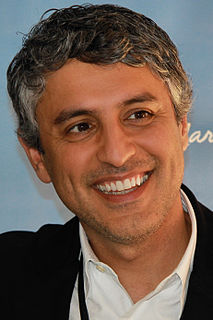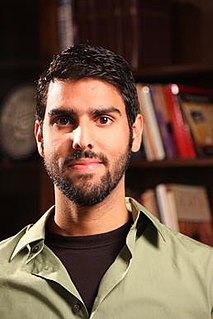Related Research Articles

In macroeconomics, an industry is a branch of an economy that produces a closely-related set of raw materials, goods, or services. For example, one might refer to the wood industry or to the insurance industry.

Comparative religion is the branch of the study of religions with the systematic comparison of the doctrines and practices, themes and impacts of the world's religions. In general the comparative study of religion yields a deeper understanding of the fundamental philosophical concerns of religion such as ethics, metaphysics and the nature and forms of salvation. It also considers and compares the origins and similarities shared between the various religions of the world. Studying such material facilitates a broadened and more sophisticated understanding of human beliefs and practices regarding the sacred, numinous, spiritual and divine.

Copts are a Christian ethnoreligious group indigenous to North Africa who have primarily inhabited the area of modern Egypt and Sudan since antiquity. Most ethnic Copts are Coptic Orthodox Christians. They are the largest Christian denomination in Egypt and the Middle East, as well as in Sudan and Libya. Copts have historically spoken the Coptic language, a direct descendant of the Demotic Egyptian that was spoken in late antiquity.

Interfaith dialogue refers to cooperative, constructive, and positive interaction between people of different religious traditions and/or spiritual or humanistic beliefs, at both the individual and institutional levels. It is distinct from syncretism or alternative religion, in that dialogue often involves promoting understanding between different religions or beliefs to increase acceptance of others, rather than to synthesize new beliefs.
Religion in Africa is multifaceted and has been a major influence on art, culture and philosophy. Today, the continent's various populations and individuals are mostly adherents of Christianity, Islam, and to a lesser extent several traditional African religions. In Christian or Islamic communities, religious beliefs are also sometimes characterized with syncretism with the beliefs and practices of traditional religions.

Christians in Bangladesh account for 0.30% of the nation's population as of 2022 census. Together with Judaism and Buddhism, they account for 1% of the population. Islam accounts for 91.04% of the country's religion, followed by Hinduism at 7.95% as per 2022 census.

Reza Aslan is an Iranian-American scholar of sociology of religion, writer, and television host. A convert to evangelical Christianity from Shia Islam as a youth, Aslan eventually reverted to Islam but continued to write about Christianity. He has written four books on religion: No God but God: The Origins, Evolution, and Future of Islam, Beyond Fundamentalism: Confronting Religious Extremism in the Age of Globalization, Zealot: The Life and Times of Jesus of Nazareth, and God: A Human History.
Religion in Papua New Guinea is predominantly Christian, with traditional animism and ancestor worship often occurring less openly as another layer underneath or more openly side by side Christianity. The courts, government, and general society uphold a constitutional right to freedom of speech, thought, and belief. There is no state religion, although the government openly partners with several Christian groups to provide services, and churches participate in local government bodies.

Religion in Egypt controls many aspects of social life and is endorsed by law. The state religion of Egypt is Islam. Although estimates vary greatly in the absence of official statistics. Since the 2006 census religion has been excluded, and thus available statistics are estimates made by religious and non-governmental agencies. The country is majority Sunni Muslim, with the next largest religious group being Coptic Orthodox Christians. The exact numbers are subject to controversy, with Christians alleging that they have been systemically under-counted in existing censuses.

As of the year 2020, Christianity had approximately 2.6 billion adherents out of a worldwide population of about 7.8 billion people. It represents nearly one-third of the world's population and is the largest religion in the world, with the three largest groups of Christians being the Catholic Church, Protestantism, and the Eastern Orthodox Church. The largest Christian denomination is the Catholic Church, with 1.3 billion baptized members. The second largest Christian branch is either Protestantism, or the Eastern Orthodox Church.

The International Student Identity Card (ISIC) is an internationally accepted proof of student status. This ID verifies students and grants them access to a diverse selection of benefits and discounts around the world. With the ISIC card a student may redeem discounts for travel, accommodation, visiting cultural institutions and other various benefits. The ISIC Association also issues the International Youth Travel Card (IYTC) for non-students, and the International Teacher Identity Card (ITIC) for teachers and professors. The membership fee varies country by country.
Growth of religion involves the spread of individual religions and the increase in the numbers of religious adherents around the world. Statistics commonly measure the absolute number of adherents, the percentage of the absolute growth per-year, and the growth of converts in the world.

Jane Dammen McAuliffe is an American educator, scholar of Islam and the inaugural director of national and international outreach at the Library of Congress. She is a president emeritus of Bryn Mawr College and former dean of Georgetown College at Georgetown University. As a specialist in the Qur'an and its interpretation, McAuliffe has edited the six-volume Encyclopaedia of the Qurʾān and continues to lead the editorial team for the online edition of the work.
Abrahamic religions are those religions that worship the God of Abraham, including Christianity, Islam, and Judaism.
Religion in Iran has been shaped by multiple religions and sects over the course of the country's history. Zoroastrianism was the main followed religion during the Achaemenid Empire, the Parthian Empire, and the Sasanian Empire. In 651 AD, the Rashidun Caliphate conquered Persia and spread Islam as the main religion. Sunnism was the predominant form of Islam before the devastating Mongol conquest, but subsequently, Shi'ism became eventually utterly dominant in all of Iran with the advent of the Safavids.

Sidney H. Griffith is a professor of Early Christian Studies at the Catholic University of America. His main areas of interest are Arabic Christianity, Syriac monasticism, medieval Christian-Muslim encounters and ecumenical and interfaith dialogue.

Islam in Lebanon has a long and continuous history. According to an estimate by the CIA, it is followed by 67.8% of the country's total population. Sunnis make up 31.9%, Shias make up 31.2%, with smaller percentages of Alawites and Ismailis. The Druze community is designated as one of the five Lebanese Muslim communities, even though most Druze do not identify as Muslims, and they do not accept the five pillars of Islam.
John Allembillah Azumah is an ordained Ghanaian minister in the Presbyterian Church of Ghana and associate professor of World Christianity and Islam. He is one of the leaders in Islam and Christian–Muslim relations and he is currently working on research in the area of World Christianity and Islam in the Global South.

Nabeel Asif Qureshi was a Pakistani-American Christian apologist. Raised by a devout Muslim family from the Ahmadi sect, Qureshi converted to Christianity as a university student following several years of debate with a Christian friend. He subsequently became a Christian apologist and was a speaker with Ravi Zacharias International Ministries (RZIM) from 2013 until 2016. Qureshi authored three books: Seeking Allah, Finding Jesus: A Devout Muslim Encounters Christianity, Answering Jihad: A Better Way Forward, and No God But One—Allah or Jesus.
References
- ↑ "About ISIC". Archived from the original on 2013-08-29. Retrieved 2013-08-29.
- ↑ http://patricksookhdeo.com/biography/ . Retrieved 2021-10-24.
{{cite web}}: Missing or empty|title=(help)